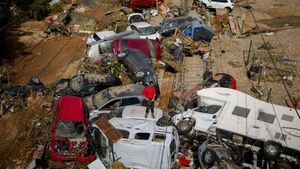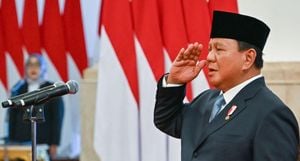With the upcoming Jharkhand Assembly elections set for 2024, the political atmosphere is heating up as major political players prepare to make their case to the electorate. The ruling parties, including the Jharkhand Mukti Morcha (JMM) and the opposition Bharatiya Janata Party (BJP), are ramping up their campaigns to secure an electoral victory. Prime Minister Narendra Modi has taken to the stage, calling for voters to reject the Congress party, framing his argument around familiar slogans of ‘roti, beti & maati’ (bread, daughters, and the soil) to resonate with the electorate.
During energetic rallies across the state, PM Modi criticized the opposition for failing the people of Jharkhand, urging constituents to recognize the perceived negligence of the Congress and its allies. He emphasized, “Throw out Congress, save ‘roti, beti & maati’,” appealing to the voters' sense of economic stability and local identity which he claims has been undermined since Congress's defeat. Modi’s rallying cry speaks to the heart of many citizens’ concerns about economic development and social justice.
On the other hand, Rahul Gandhi, camping on his ground, has similarly lashed out, accusing the BJP of undermining traditional rights and opportunities for the indigenous population by purportedly exploiting local resources for their own benefit. He argued, “Each and every infiltrator will be deported from Jharkhand,” by Home Minister Amit Shah, conveying discontent with the central government’s management of local issues and the growing perception of insecurity among residents.
The backdrop of these political machinations includes the significant upheaval created by the socio-political conditions within Jharkhand. The state has was plagued by challenges posed by poverty and naxalism. Amit Shah claims naxal activities have left the people of Jharkhand impoverished even as the state powers the nation with resources like coal. He accuses local parties such as the JMM and Congress of failing to address these longstanding issues.
Union Home Minister Shah, rallying support for the BJP, has lampooned the opposition's agenda by claiming, “Whether it is Congress, RJD or JMM, all of them are here to loot you… Letting Bangladeshis and Rohingyas sneak through Jharkhand is causing land and love jihad,” remarks aimed at inciting fear and reaffirming his party's stance on national security and local identity.
With accusations flying left and right, it becomes clear this election is going to be as much about mocking the opponent's record as it is about presenting one's own vision. For the Congress and its allies, the endeavor seems to involve showcasing their efforts at social advancement and highlighting Modi's past comments about the Constitution, positing him as disconnected from historical accountability. When Rahul Gandhi remarked, “The Constitution may be blank for him because he has never read it in his life,” it illuminated the ideological battleground within this neck-and-neck race.
The rhetoric has been carefully calibrated as both sides seek to leverage local sentiments and deeply rooted ideologies as election day approaches. A recently recorded voter turnout of 66.18% is evidence not only of the electorate's engagement but also of the high stakes brewing this time around, across 43 assembly seats during the initial phase.
Given the volatility present within Jharkhand's political environment, the electorate looks set to have their ear to the ground as high-profile leaders endeavor to weave narratives of promise and peril, all the rotating around the potent combination of economic stability, social justice, and national identity. How the various claims made resonate with the people amid rising political tempers will undoubtedly shape the future of Jharkhand.



